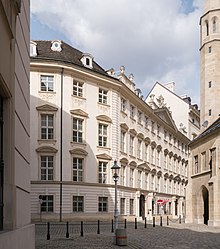
The Federal Ministry of Education and Research, abbreviated BMBF, is a cabinet-level ministry of Germany. It is headquartered in Bonn, with an office in Berlin. The Ministry provides funding for research projects and institutions and sets general educational policy. It also provides student loans in Germany. However, a large part of educational policy in Germany is decided at the state level, strongly limiting the influence of the ministry in educational matters.
Ebba Koch is an Austrian art and architectural historian, who defines and discusses cultural issues of interest to political, social and economic historians. Presently she is a professor at the Institute of Art History in Vienna, Austria and a senior researcher at the Austrian Academy of Sciences. She completed her doctorate in philosophy and her Habilitation at Vienna University.
The Virtual Global University (VGU) is a virtual university offering online distance education or virtual education on the Internet.
The Reich Ministry of Science, Education and Culture existed from 1934 until 1945 under the leadership of Bernhard Rust and was responsible for unifying the education system of Nazi Germany and aligning it with the goals of Nazi leadership.
The Österreichisches Wörterbuch, abbreviated ÖWB, is the official dictionary of the German language in the Republic of Austria. It is edited by a group of linguists under the authority of the Austrian Federal Ministry of Education, Arts and Culture and contains a number of terms unique to Austrian German or that are more frequently used or differently pronounced there. A considerable amount of this "Austrian" vocabulary is also common in Southern Germany, especially Bavaria, and some of it is used in Switzerland as well. The most recent edition is the 43rd from 2017. Since the 39th edition from 2001 the orthography of the ÖWB was adjusted to the German spelling reform of 1996. This dictionary is also in official use in the Italian province of South Tyrol.
The Heinz Maier-Leibnitz-Preis, in honor and memory of the German physicist Heinz Maier-Leibnitz, is funded by the Bundesministerium für Bildung und Forschung, and it is awarded by a selection committee appointed by the Deutsche Forschungsgemeinschaft and the BMBF. Since 2013, there are ten recipients of the prize and each receives 20,000 Euros, which is an increase over the original 16,000 Euros that had been given to six recipients per year until 2012.
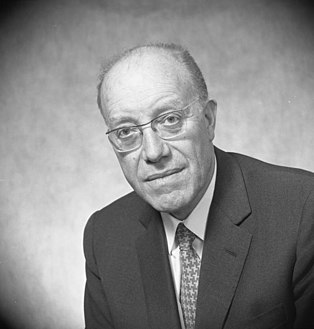
Heinz Maier-Leibnitz was a German physicist. He made contributions to nuclear spectroscopy, coincidence measurement techniques, radioactive tracers for biochemistry and medicine, and neutron optics. He was an influential educator and an advisor to the Federal Republic of Germany on nuclear programs.

Munich School of Philosophy is a small Jesuit higher education college in Munich, Germany founded in 1925. In the German-speaking countries it is the only institution of higher education exclusively specialized in the study of philosophy.
The Gesellschaft für Didaktik der Mathematik (GDM) is a scientific society pursuing the goal to foster mathematics education, particularly in German-speaking countries. It seeks cooperation with the respective institutions in other countries.
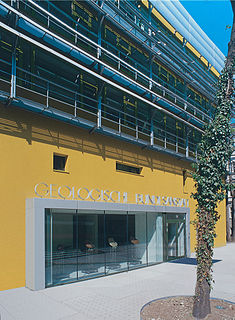
The Geological Survey of Austria in Vienna is a subordinate agency of the Austrian Federal Ministry for Science and Research and is the central point for information and advice in the field of earth sciences for the Republic of Austria. The most important product of the GBA is a range of geological maps. These appear in various scales both as map series and as regional maps. They form the basis for responses to questions in many areas of business and also for research. The GBA is located in the district of Landstraße in Vienna.

The Hessian Ministry of Higher Education, Research and the Arts is a university and culture ministry in Hesse, Germany.

In Austrian politics, the Ministry of Transport in the ministry in charge of railways, transport policy, and the postal system.
Kathrin Röggla is an Austrian author and playwright. She was born in Salzburg. She has written numerous prose works, including essays, drama and radio plays. She has won many awards for her work.
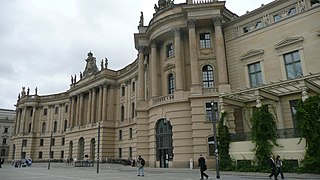
The Humboldtian model of higher education or just Humboldt's Ideal is a concept of academic education that emerged in the early 19th century and whose core idea is a holistic combination of research and studies. Sometimes called simply the Humboldtian model, it integrates the arts and sciences with research to achieve both comprehensive general learning and cultural knowledge, and it is still followed today. This ideal goes back to Wilhelm von Humboldt, who in the time of the Prussian reforms relied on a growing educated middle-class and thereby promoted the claim on general education.
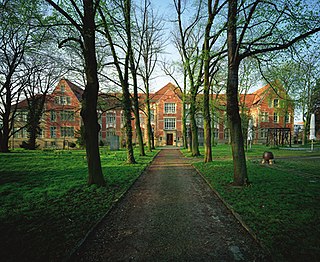
Merz Akademie is a non-profit, nationally accredited university of arts, design, and media in Stuttgart, Germany, created with an emphasis on the disciplines of humanities, social and cultural studies, design, art and technology. Merz Akademie comprised a classical art academy, a technical college and a school of humanities.
The Reichsanstalt für Film und Bild in Wissenschaft und Unterricht, before 1940 known as the Reichsstelle für den Unterrichtsfilm was a branch of the Reich Ministry of Science, Education and Culture which was charged with the creation of educational films during the Third Reich. The office was founded on June 26, 1934 and was headed by Kurt Gauger, a member of the Nazi SA and the Volkssturm.
Anke Grotlüschen (*1969) is an educational researcher and professor at the University of Hamburg.
Ina Wagner is an Austrian physicist, computer scientist and social scientist. She is an emeritus professor of computer science at TU Wien (Vienna), where she was active from 1987 until 2011.
